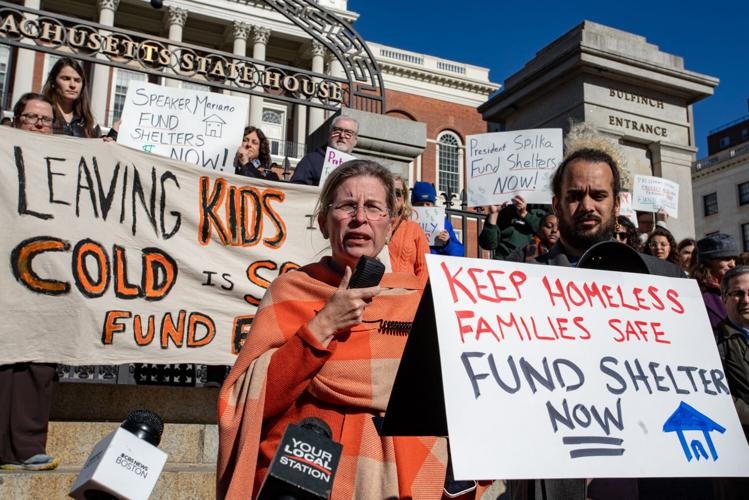latest
MBTA Conference Rooms Converted To Overnight Shelter in Massachusetts

By Sam Doran
Families in need of emergency shelter will begin temporarily setting up in conference rooms in a state office building in Boston, an unusual development that the top House Democrat said points to the need for overflow shelter sites.
More than a week after the Healey administration began placing shelter-seeking families on a waitlist, officials announced Monday that they will use part of the MBTA’s headquarters to temporarily house eligible families for whom no space is available.
“In order to ensure that families eligible for Emergency Assistance shelter have a safe and warm place to sleep at night when there is not a shelter unit immediately available, the administration is utilizing space at 10 Park Plaza as a temporary, overnight facility,” retired Lt. Gen. Scott Rice, the administration’s emergency assistance director, said in a one-sentence statement.
Second-floor conference rooms in the State Transportation Building, the downtown Boston home of MBTA and state Department of Transportation offices, were converted into congregate shelter available to waitlisted families who need a place to stay overnight.
Up to 25 families can stay in the space, which has cots and limited amenities, during the evening and overnight hours, according to an administration official. Gov. Maura Healey’s team projects the temporary site will operate for about two weeks until another safety net shelter program comes online.
Officials did not immediately respond to inquiries about plans to use other state office buildings as shelter during the crisis, nor make clear what safety net shelter program would replace the site in MBTA conference rooms.
While Democrats on Beacon Hill like to defer comment on matters pending before conference committees, House Speaker Ron Mariano on Monday seized on the news to promote the House’s pending plan to force Healey to set up overflow sites.
“Recent reports of families sleeping at Logan Airport, and now at a temporary overflow site at MassDOT, are emblematic of the need for funding that is specifically reserved for overflow shelter options with greater capacity,” Mariano said in a statement. “The House remains committed to ensuring that families in Massachusetts have somewhere safe and warm to sleep at night, and will continue to urge the Administration to identify additional overflow shelter sites going forward.”
MBTA General Manager Phil Eng announced the new strategy in a Monday morning memo to T employees. The Boston Globe first reported on his internal communication, after which MBTA and Healey administration officials released limited details about the plan.
Eng said National Guard personnel set up the temporary shelter and that an unnamed service provider will manage its operations.
He told T workers he does not anticipate “any changes to our work environment because of the temporary shelter,” noting that the upcoming Thanksgiving holiday will shorten the work week.
“I have been asked if there are families needing clothing or other essentials. Family needs will be assessed, and if there is a need, we are considering launching a clothing drive. Should that be necessary, I will share that information with employees,” Eng wrote. “I appreciate everyone’s support as we enter Thanksgiving week. While we celebrate with our families and friends, know that we are helping others during their time of need. I wish all of you an enjoyable holiday with your loved ones.”
Second-floor conference rooms will be used for shelter services, but the plan does not impact the larger board room that regularly hosts MBTA and MassDOT public meetings, an official said.
Anti-homelessness advocates gave the plan a positive, but muted, reaction. Andrea Park, director of community driven advocacy at the Massachusetts Law Reform Institute, called it “welcome but belated, as dozens of families are already on a waitlist with no place to sleep.”
“With an estimated 90 families currently on the waiting list for shelter and many more families expected to be added to the waiting list in the coming days and weeks, we hope that the Administration and Legislature can work together to ensure swift access to shelter for all families determined eligible for EA, whether in longer-term placements or overflow sites,” added Kelly Turley, associate director of the Massachusetts Coalition for the Homeless. “With waitlisted children and families seeking shelter in places such as Logan Airport, South Station, emergency rooms, police stations, and cars in the meantime, it is imperative that the Commonwealth bring safe, alternative shelter sites online and to scale immediately.”
Although Massachusetts by law must provide shelter to eligible families and pregnant women, Healey implemented a 7,500-family cap on the shelter system after months of rapidly increasing demand, much of it fueled by migrants newly arriving to the state.
The system hit the new limit on Nov. 9. Since then, eligible shelter-seekers could be placed on a waitlist instead of guaranteed placement.
In recent days, the state appears to have moved more families out of the shelter system. State data counted 7,545 families enrolled as of Nov. 10 and 7,505 enrolled as of Nov. 17, with only a handful — if any — joining the system each day in that span.
The administration’s decision to use state office space as a temporary option comes amid ongoing disagreement between House and Senate Democrats about how to respond to the months-long emergency.
Both branches agreed to steer $250 million more into the shelter system, an injection Healey requested in mid-September. However, the House wants to order the administration to stand up at least one “overflow site” to support eligible families placed on a waitlist, while the Senate does not want to dictate specific steps.
Top Democrats abandoned their attempts to find agreement in the early-morning hours Thursday and ended their formal sessions for the year with no deal in place. The Legislature returned to session Monday after four days off but Democrats have not reached an accord.
Spokespeople for House Ways and Means Committee Chair Aaron Michlewitz and Senate Ways and Means Committee Chair Michael Rodrigues both said the duo continue to discuss potential compromises. Although the House and Senate punted the underlying spending bill into a conference committee for formal negotiations, the panel has not yet scheduled its first meeting.
Sen. Patrick O’Connor of Weymouth, one of two Republicans on the conference committee, said Monday he is not concerned by Michlewitz and Rodrigues continuing their deliberations before the panel convenes.
“Being able to have an open dialogue and try and find compromise is key and paramount to everything we do up here. It’s just my hope that as negotiations at the higher level with Aaron and Mike continue and as the conference committee process starts, everyone’s cognizant of the fact there were a lot of items inside the supplemental budget,” O’Connor told the News Service. “My hope is that some of these issues that we share language on … especially things like the raises and disaster relief and other items, those can be worked out, and some of the larger disagreements can be worked on during the conference committee.”
-

 Community6 years ago
Community6 years agoNational Shrine of La Salette Festival of Lights 2017 set to begin
-

 Community6 years ago
Community6 years agoMassachusetts State Police looking for good home for retired dogs
-

 Crime6 years ago
Crime6 years agoFall River ranked most dangerous city in Massachusetts according to report
-

 latest6 years ago
latest6 years agoDurfee student allegedly overdoses on marijuana
-

 Community6 years ago
Community6 years agoVideo of Fall River Police goes viral
-

 Causes6 years ago
Causes6 years agoMissing Fall River woman found deceased
-

 Crime6 years ago
Crime6 years agoFall River Police add names to most wanted list
-

 Causes6 years ago
Causes6 years agoFall River teenager reported missing has been found






Joanne Cadieux -Szala
November 21, 2023 at 9:07 am
How about we close the borders until we can house our own. Supporting refugees is taking away from our own people.
Former facilities director
November 21, 2023 at 11:52 am
I have an idea. All UMASS campuses have lots of conferences rooms.